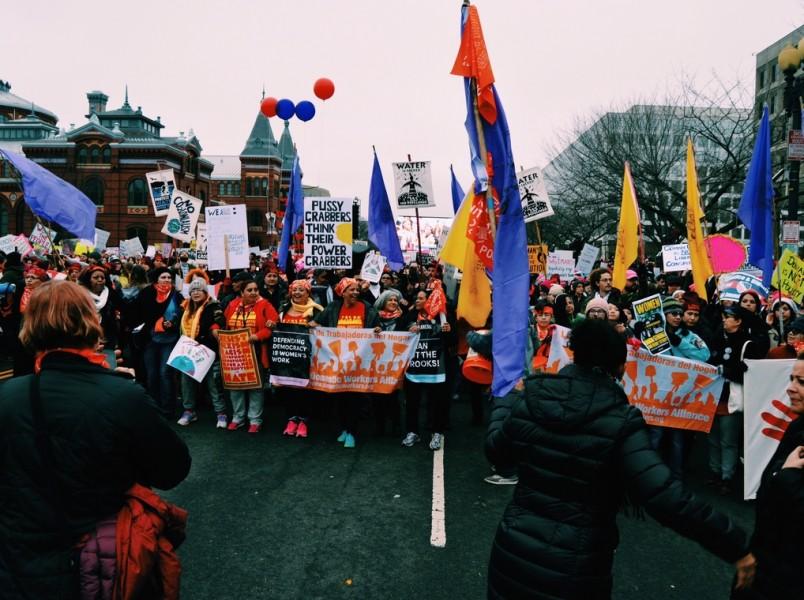Tulane joins women’s march in D.C.
Nearly half a million people’s footsteps echoed across Washington, D.C. during the Women’s March on Washington Saturday. Riding 20 hours from New Orleans, 56 Tulane students added their voices to the chants that rang across the capital.
“My general reactions were of awe,” Nicole Carle, junior and president of Tulane Women in Politics, said. [The march] was truly people there to learn about each other, to support one another and to be cognizant of the current political climate.”
The announcement of the D.C. Women’s March followed President Donald Trump’s election. The march’s intention was to show solidarity for the protection of human rights, safety, health and families.
Tulane graduate students Mira Kohl and Miranda Stramel proposed the idea of sending a bus of Tulane community members to the march.
“Early on after the election I realized I needed to put one foot in front of the other and not indulge in inaction,” Kohl said. “Working on the bus trip was about maintaining my sanity. Then, when we started receiving support and encouraging words from folks on campus, it was about building a community and learning how to work together to make this vision a reality.”
Kohl and Stramel worked during the fall semester and winter break to organize the trip. Within days of posting about the event online, double the bus’s maximum capacity signed up to participate.
“We may have originally thought [attending the march] was a crazy pipe dream,” Kohl said. “We only half-believed we could pull it off. We were floored by the overwhelming response from undergraduates who desperately wanted to participate in this trip.”
All students attending the trip met for orientation on Jan. 18. The orientation leaders discussed the details of the trip and safety measures.
“We felt it was very important to stress safety and responsibility, as well as the difference between peaceful demonstration for an issue versus protest against something or someone,” Stramel said.
Edith Wolfe, faculty chaperone and associate director of undergraduate affairs at the Stone Center for Latin American Studies, said getting around the city was difficult.
To account for massive crowds and overcrowded public transit, Tulane attendees established meet-up locations and broke into smaller groups once they arrived in D.C. Participants had limited cell phone service and internet connection due to the crowds.
“The Metros had a line around the block,” Wolfe said. “It could be like an hour, two hours to get down to the platform … It was intense.”
Wolfe said everyone on the train appeared happy and participants created connections and a sense of community by sharing their experiences with strangers.
The cost for the trip was $90 per attendee, and five scholarship seats were available for students with financial need. The original cost was higher at $250, but Kohl and Stramel received funding and organizational assistance from various sectors of the Tulane community.
Tulane WIP and Tulane Women in Technology sponsored and organized the trip. The Center for Academic Excellence, Center for Engaged Learning and Teaching, Newcomb College Institute, Stone Center for Latin American Studies, the Department of Gender and Sexuality Studies and the Center for Public Service collaborated for the event.
Susann Lusnia, associate professor in Tulane’s Department of Classical Studies, knitted hats for trip attendees and Lucia Monoh, Tulane alumna, organized a fundraising event at Felipe’s.
While the majority of marchers identified as female, the march drew a crowd of diverse races, ages and genders. Tulane participants included undergraduate students, graduate students and faculty members.
Sophomore Caleb Horowitz was one of three male participants from Tulane.
“Yes, this is the women’s march, and it is important to remember this, but I really think that the whole thing is more about standing in solidarity with people whose rights are being trampled on.”
Your donation will support the student journalists of Tulane University. Your contribution will allow us to purchase equipment and cover our annual website hosting costs.

















Leave a Comment